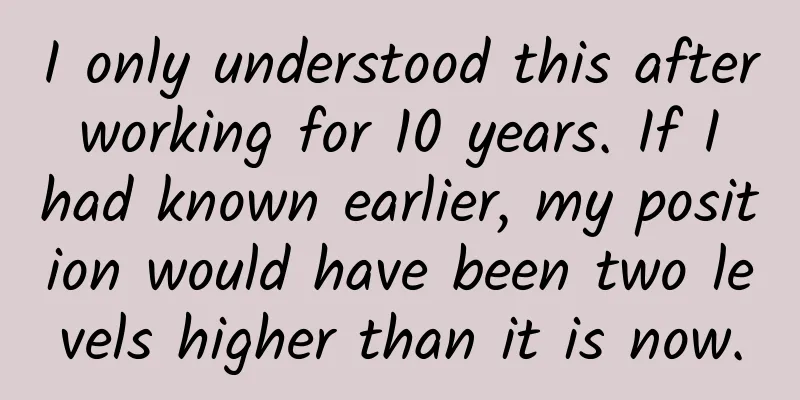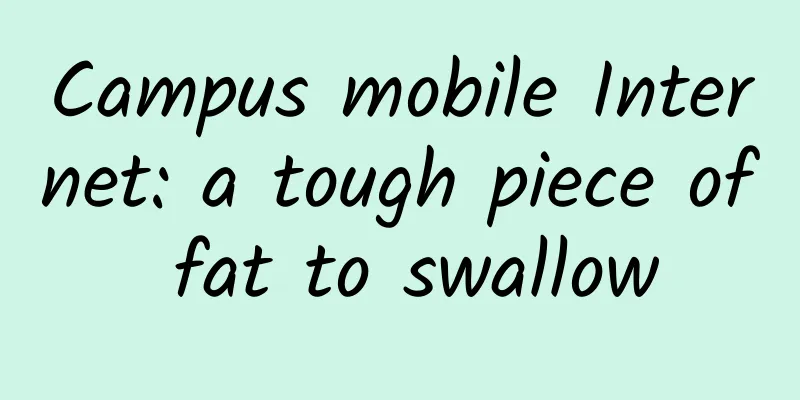I only understood this after working for 10 years. If I had known earlier, my position would have been two levels higher than it is now.

|
No matter what industry you are working in now, no one can guarantee that this position will still exist in the next 5 to 10 years. If the position or even the industry is gone, can the professional knowledge you have accumulated in the past 10 years help you migrate to another emerging industry competitively?
1. What is the “essence” of a job? What is the “essence” of a job? 1. Money is not the essence of work There is a popular question on Zhihu: "What have you done because you were poor?" The answer with the most likes is "work". While we admire this insightful answer, we also see the meaning of work in the eyes of most people - providing money for survival or living. Money is indeed the most basic value of work. This is the basic starting point for why we are willing to offer a monthly salary of 10,000+ to fresh graduates, and it is also the reason why BAT and Huawei offer high salaries to technical men, but this is far from the "essence" of a job, because if it is just for making money, work is not the only way, or even the best way. At least the money you have from real estate speculation and being a rich second generation is definitely more than the wealth that 99.99% of people earn from working. 2. Mastering professional knowledge or skills is not the “essence” of the job Suppose that in 1980, you made a living by repairing radios, and you were the best repairman in the area. In 2016, would you make a living by your knowledge or skills in repairing radios? It is 2010 and you are an accountant. Your expertise in identifying fake invoices and your proficiency in producing financial statements make you indispensable in the eyes of your boss. However, as the State Administration of Taxation vigorously promotes electronic invoices and financial software produces financial statements more and more intelligently, and accounting work is fully automated in the near future, will your six years of accounting knowledge and experience still be used as capital for your next job? In 2016, if you are a journalist tracking hot news, and 80% of news from well-known media such as Forbes and the New York Times is written by machines, how far do you think you are from being unemployed if you only rely on the knowledge and skills of writing press releases?
Over the past two centuries, the entire human race has been developing at an accelerated pace. Society is full of vitality and plasticity, and is in a state of constant change. The changes in one year now are greater than those in the past 100 years. A 30-year-old boy or girl can also tell those teenagers who would never believe it: "When I was young, the whole world was completely different." Take the Internet, which you can't live without for a quarter of an hour now. Can you believe that the Internet was only widely used in the 1990s and has only a history of about 20 years? But now we can't imagine what life would be like without the Internet.
Computers are exponentially improving their understanding of the world. In the next 5 to 10 years, new technology platforms will reshuffle most traditional industries. All exponential technologies will disappoint people for a while after they are born, but once they begin to mature, they will become excellent and mainstream in just a few years. In the future, all programmable mental work - such as accountants, BI analysts, English training teachers, Go coaches, etc., will definitely be replaced by machines, and machines will definitely do better than humans. In 2016, AlphaGo defeated Lee Sedol, one of the best Go players in the world, marking the entry of machines into the field of solving "problems with no standard answers" and declaring their lead over humans in some areas. In the United States, young lawyers can no longer find jobs (the NALP survey found that only 24% of the 2014 law school graduates had found jobs in the law field before February). Thanks to IBM Watson ("Watson" is an artificial intelligence system that can answer questions in natural language), you can get legal advice in seconds. Although it is still more or less basic legal services, the accuracy rate is 90%, compared to the 70% accuracy rate of young lawyers who do it manually. In the future, 90% of people will be self-taught generalist lawyers with the help of machines. Therefore, no matter what industry you are working in now, no one can guarantee that this position will continue to exist in the next 5 to 10 years. If the position or even the industry is gone, can the professional knowledge you have accumulated in the past 10 years help you migrate to another emerging industry competitively? Obviously not! It’s not “money”, nor “professional knowledge”, so what is the “essence” of a job? In this era of exponential change in human society, the essence of work is to provide you with an opportunity to extract "transferable skills". 2. What is “transferable capability”? "Transferable skills" are the skills you can reuse after you transfer from one position to another, or from one industry to another. In layman's terms, "Today you are an accountant, and tomorrow you are transferred to HR, you can reuse the skills you have extracted from accounting to do a good job; 6 months later, you are transferred to marketing, and you can still reuse the skills you have extracted from accounting and HR to do a good job." 1. 70% of the core competencies of all existing human jobs are common The knowledge gap between accounting, HR and marketing is huge, and almost all of them require new learning. However, the core competencies required for these three jobs overlap by at least 70%:
In fact, it is not just accounting, HR, and marketing that have many similarities in their core competencies. In all existing jobs, 70% of the core competencies are common. These common core competencies are transferable competencies, which we should be able to extract from any job. 2. Extracting “transferable skills” is the best preparation for an uncertain future We may be approaching the next singularity. Singularity is a concept proposed by theoretical physics when applying Einstein's general theory of relativity to cosmology. The physical rules of the universe before and after the singularity are completely different. The Big Bang is a point. Before this singularity, all the natural laws we know did not exist, even time did not exist. When we reach the next singularity, none of us knows where humanity will develop next, what new industries will emerge, and naturally we don’t know what knowledge will be useful for the next job. In this state, our best preparation is not to store knowledge that may become invalid at any time, but to extract transferable skills that can adapt to the uncertain future at work. 3. How to extract “transferable skills” from work Every job is actually a very exciting experience, but how much transferable skills you can extract from this experience depends on your ability to build and apply the "framework", which directly determines the speed of your career advancement. To see how much impact the ability to effectively construct and apply a "framework" has on extracting "transferable skills" from work, we can take a look at the career development trajectories of two of my college classmates. I have two college classmates who were hired by a Shenzhen company when they were recruiting on campus. They had the same position, the same starting salary, and the same job content. One of them stayed in the company for three years, and 10 years after graduation, he was the general manager of a company and became a high net worth individual as defined by the bank; the other stayed in the company for two years and is now the manager of the IT department of a factory outside Shenzhen, and even has a hard time getting a foothold in Shenzhen. Both of them are graduates from pretty good 985 universities and started from the same point of view. What exactly caused the difference between the two? At that time, the two of them were involved in a project to implement enterprise management software. The work was very hard. They had to work overtime until 11 or 12 o'clock every night on weekdays. Therefore, they liked to have dinner with me on weekends to relax. Asking them about their work situation during the meal has basically become a regular program. When talking about work, the current general manager usually says: "This week, my understanding of the client's supply chain business and interviews with the client to find out their needs were OK, but I am still far behind the consultants in terms of talking with the client's senior management and supervising the client's work progress. Next week I plan to find a book on project management and systematically sort out project management methods." The current IT manager would usually say: "I'm so unlucky to be involved in this project! The Japanese client's requirements are very abnormal, and the consultant who led us is too flattering. He does whatever the client says and is not assertive at all. I have to work overtime every day. If I have the chance, I'd better change the project as soon as possible." The gap between the two people's subsequent development was opened in the above conversation. The current general manager actually compiled a consultant capability model diagram (as shown below), so he was able to compare the actual project work with this capability model diagram, and find the corresponding points in the capability model diagram where he did not do well (knowing that dialogue with senior management and supervising the progress of customer work belong to the content of stakeholder management and progress management in project management), so as to purposefully find methods and ways to make up for it (find a book on project management and study it systematically).
Because he has mastered the ability to build and apply frameworks, no matter what job he changes to, he will first build a capability framework, and then systematically learn and accumulate experience purposefully. Therefore, the capabilities he can extract from a job will be comprehensive, and the reusable capabilities will be easily enabled in the next job. The current IT manager did not have the habit of thinking in this application framework. Although they worked on the same project, he could not see the gap in his ability dimension and only complained about the shortcomings of the objective environment. If he changed to another job, he still could not improve his ability comprehensively, and the ability he accumulated from the previous job was also very limited. This way of thinking that uses frameworks to analyze, solve problems, and learn is called systems thinking. Therefore, systems thinking is a necessary way for a person to extract abilities from experience, and it is also a decisive factor in the level of ability extraction. In fact, even a senior management consultant who charges clients 50,000 yuan a day in consulting fees cannot understand any industry or business better than the client, and it is even more impossible for a consultant to understand their own business better than the client, but a consultant must know how to solve problems better than the client. The core value of a consultant does not lie in having a deeper understanding of the industry or business than the client, but in being able to build a framework to solve problems to help the client. Therefore, the basis for the survival of a consultant is a systematic way of thinking and solving problems. Similarly, it is impossible for a company's boss or senior manager to be more professional than his subordinates in all business areas of the company. If this is the case, the company will not spend a lot of money to hire professionals. In fact, the core value of company bosses and senior managers does not lie in the amount of professional knowledge or industry experience, but in the ability to build a framework to solve problems. This is why senior managers of companies can transform into consultants, and consultants can also transform into senior managers or bosses of companies. |
<<: A rough and fast Android full-screen adaptation solution
>>: 13 aspects to consider when developing a mobile app
Recommend
Hezhou Mini Program Customization Company, how much does it cost to customize an automatic ordering mini program?
There is no fixed price for the customization of ...
Jia Yueting: If Samsung TV doesn't reform, it will be overthrown by LeTV
It is obvious that after experiencing the rapid v...
Interpreting the brand strategy adjustment behind Ogilvy’s LOGO change!
On June 6, Ogilvy announced the launch of a new b...
Tao Hong’s personal profile: What should I do if the Baidu snapshot for website promotion and optimization updates slowly or does not update at all?
When a search engine enters a web page, it will b...
Why does it hurt when you see others getting hurt?
Have you ever had such an experience? In life, wh...
Why is Honor of Kings always the first choice for brand IP collaboration?
Whenever we take stock of IP cooperation cases, H...
The "Four-Hour Sleep Method"? Is it really reliable to imitate animals in sleeping?
"Turning around the red pavilion, lowering t...
If you are losing weight, please keep this good news
Audit expert: Wu Xi Deputy Chief Physician, Depar...
To give giraffes “manicures”, you have to start when they are babies!
In the previous sharing, we discussed in detail t...
Wolf Shuai's A-share Devil's Dictionary - Stock Market Secrets
Lang Shuai's A-share Devil's Dictionary - ...
How much does it cost to customize the Baoji kitchen mini program? What is the price for customizing Baoji Kitchen Mini Program?
What is the price for customizing Baoji Kitchen M...
A complete analysis of the Internet marketing plan
With the rapid development of mobile Internet, th...
The 30th Lan Guilian Illustration Course will end in October 2020 (The 30th Lan Guilian Illustration Course)
Lan Guilian Illustrations No. 30 Course Ends in O...
Beijing Health Code is online! How to use? A must have for these occasions! Attached operation steps
Currently, except for Hubei Province, most compan...
The upgrading of new energy vehicle industry presents three major changes which will promote intelligent networking
The upgrading of the new energy vehicle industry ...









